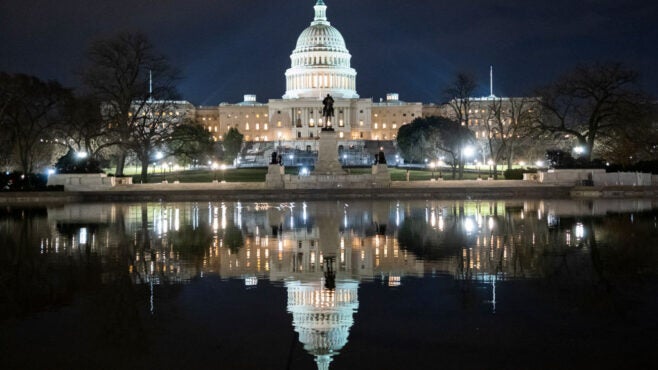The late Democratic Senator Robert Byrd was known as the ‘King of Pork’. It is a moniker he embraced. A long-time chairman of the Senate Appropriations Committee, with the power to direct discretionary spending, Byrd took pride in bringing billions of dollars in federal spending home to West Virginia, one of the US’s poorest states. Now, one of his successors, West Virginia Democratic Senator Joe Manchin III, will soon wield as much power as Byrd once did.
Victories by two Democrats in last week’s run-off elections in Georgia tipped the balance of power in the US Senate. When Jon Ossoff and Raphael Warnock are sworn in later this month, Democrats will hold 50 seats, creating an evenly split Senate. Under the US Constitution, Vice-President-elect Kamala Harris, as president of the Senate, breaks ties. That power gives Democrats the slimmest of majorities and wrests control of the chamber from Majority Leader Mitch McConnell. It also makes Senator Joe Manchin, the most conservative Democrat in the Senate, a pivotal swing vote in the new majority.

Access deeper industry intelligence
Experience unmatched clarity with a single platform that combines unique data, AI, and human expertise.

Democratic control of the Senate provides Joe Biden a narrow window, at least until the November 2022 mid-term elections, to pursue his $2trn climate plan. Biden begins his term on 20 January with a rare trifecta in US politics: single party control of the House of Representatives, Senate and White House. Unitary control of the White House and Congress means Biden can largely control his own destiny for the next two years.
House Speaker Nancy Pelosi and incoming Senate Majority Leader Chuck Schumer will be able to pass a federal budget that reflects White House priorities. They will control which bills come to the floor of the House and Senate, and when they do so.
In the Senate, Democratic control means senators who today are ranking members of the minority on committees will soon take over as chairs, able to convene and schedule hearings, and control the fate of legislation assigned to their committees. The Democratic majority ensures Joe Biden will find it easier to fill federal judgeships, to populate his Cabinet, and to confirm the 1,000 senior political officials across the Executive Branch who come in with a new president.
Likely defector
Democratic control, however, does not denote omnipotence. The Democrats’ tenuous majority means that for many votes, the entire caucus must vote together, without defections. For controversial votes, Democrats will have to win support from at least ten Republicans to overcome a filibuster, the Senate’s procedural brake.

US Tariffs are shifting - will you react or anticipate?
Don’t let policy changes catch you off guard. Stay proactive with real-time data and expert analysis.
By GlobalDataAnother procedural tool, budget reconciliation, permits legislation to pass with a simple majority, without the threat of a filibuster, but it can be used just once a year and only for a bill that affects federal taxing or spending. Chuck Schumer’s ability to cajole and round up his caucus will be tested time and again.
Democratic control of the Senate provides Joe Biden a narrow window, at least until the November 2022 mid-term elections, to pursue his $2trn climate plan.
Joe Manchin will hold a unique position of influence in the 117th Congress. Manchin is not just the most conservative member of Schumer’s caucus; for any given vote, he is the most likely defector. Manchin has voted with Donald Trump 51.2% of the time. Manchin’s state, West Virginia, voted for Donald Trump by a margin of nearly 40% in the November 2020 election. Manchin may be the last Democratic senator elected from West Virginia for some time.
Further complicating matters for Schumer and the White House, Manchin, the incoming chairman of the Senate Energy and Natural Resources Committee, has a middling pro-environment voting record. His lifetime score from the League of Conservation Voters, an environmental advocacy group, is just 49%. Manchin will be the gatekeeper for Joe Biden’s clean energy plans.
Fossil fuel exit
Even more problematic for the White House, Manchin’s Republican counterpart is Wyoming Senator John Barrasso. Republican Senate caucus term limits forced Barrasso’s predecessor, Alaska Senator Lisa Murkowski, from her leadership post on the energy committee. Murkowski is a rare creature in today’s Republican Party; a relatively pragmatic, independent thinker open to action to prevent climate change. Ranking member Barrasso, meanwhile, is an opponent of the Green New Deal committed to maintaining the viability of his state’s fossil fuel-dependent economy.
[Keep up with Energy Monitor: Click here to subscribe to our weekly newsletter]
For many in West Virginia and Wyoming, the myth around the economic primacy of coal persists. Manchin not so subtly hinted at the affinity for coal he shares with Barrasso in a statement welcoming the Republican to the energy committee. “Senator Barrasso and I both come from states that are blessed with a wide array of natural resources, and I know that will serve as a basis for us to work together in the 117th Congress.”
Compromise is not impossible. Months-long negotiations by Manchin and Murkowski yielded a surprising breakthrough in a clean energy package inserted into the omnibus spending/Covid-19 relief bill passed by Congress just before Christmas. The bill included $35bn for energy R&D programmes, extended federal tax credits for solar and onshore wind projects, and established offshore wind tax credits through 2025.
Also buried in the package is the secret to progress on climate and clean energy under a Manchin-Barrasso-led energy committee: billions of dollars for carbon capture, utilisation and storage at power plants and industrial facilities, and research into other emissions-reducing technologies for hard-to-decarbonise sectors like heavy industry.
To advance his clean energy agenda, Joe Biden must be willing to spend billions more to help West Virginia and Wyoming transition from fossil fuels. It is a trade worth making.


